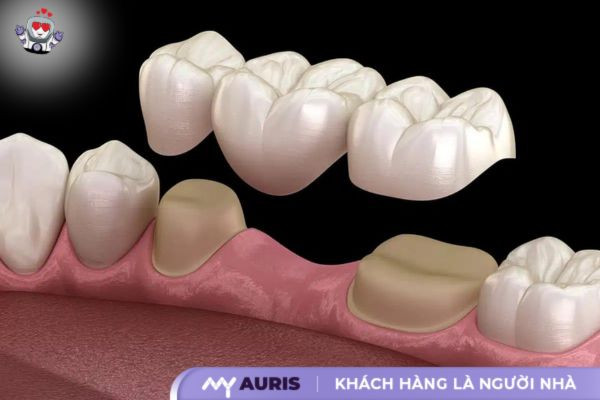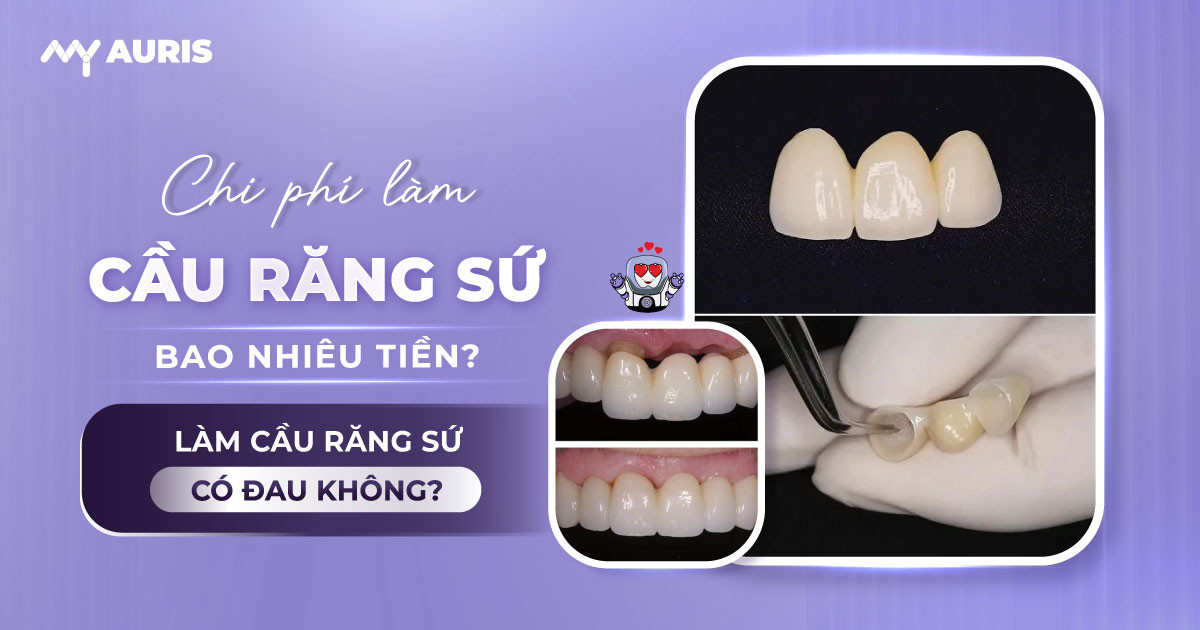Ceramic dental bridge is a fixed solution for restoring missing teeth, chosen by many people thanks to its high aesthetics, ability to effectively restore chewing function and quick implementation time. However, one of the common questions is how much does it cost to make a porcelain dental bridge? Find out with My Auris now!
How much does it cost to make a porcelain dental bridge?
The cost of making a porcelain dental bridge depends on the number of teeth that need restoration and the type of tooth. Porcelain of choice. At My Auris Dental Clinic, the price of porcelain dental bridges ranges from 1,000,000 VND/tooth – 14,000,000 VND/tooth, depending on materials and restoration technology.
Compared to removable dentures. Or dental implants have a relatively fixed price, porcelain dental bridges are flexible in cost, helping customers easily choose a suitable solution to restore missing teeth.
For detailed porcelain dental price list, you can refer directly to My Auris Dental Clinic or contact us for specific advice. body:
| Type | Odd teeth | More than 16 Teeth | Warranty | Origin |
| Ceramic teeth Zirconia | 2,500,000 | 1,500,000 | 5 Years | Germany |
| DD.Bio porcelain teeth | 4,500,000 | 3,500,000 | 10 Years | Germany |
| Cercon HT porcelain teeth | 6,300,000 | 4,500,000 | 15 Years | Germany |
| HT Simle porcelain teeth | 6,000,000 | 4,000,000 | 10 years | Germany |
| Lava Plus Porcelain Teeth | 7,500,000 | 6,000,000 | 20 Years | USA |
| Orodent Pro porcelain teeth | 15,000,000 | 9,000,000 | 30 Years | Italy |
| Orodent Pro Max porcelain teeth | 28,000,000 | 15,000,000 | 50Year | Italy |
| Emax porcelain teeth (ST) | 9,000,000 | 7,000,000 | 30 Years | Germany |
| Lisi porcelain teeth (ST) | 10,000,000 | 8,000,000 | 50 Years | Japan | Germany |
| Emax porcelain teeth (BLK) | 12,000,000 | 12,000,000 | Lifetime | Germany |
| Lisi porcelain teeth (BLK) | 12,000,000 | 12,000,000 | Lifetime | Japan |
| Lumex porcelain teeth | 12,000,000 | 12,000,000 | Lifetime | Japan |

Advantages and disadvantages of dental bridges porcelain
When choosing the method of restoring teeth with a ceramic bridge, customers need to carefully consider both the advantages of porcelain bridges and the disadvantages of porcelain bridges to ensure the appropriate decision.
Advantages of porcelain dental bridges
- Ensures facial aesthetics: Porcelain teeth are crafted with the same color, size and shape as real teeth, helping to restore a natural smile and improve appearance.
- Restore chewing function: With high strength, porcelain bridges help patients eat comfortably and sense food better than when they lose teeth.
- Fixed firmly on jaw: NoLike removable dentures, porcelain bridges are permanently attached, so you don’t have to worry about them falling out when eating, drinking or communicating. Oral hygiene also becomes easier.
- Quick implementation time: It only takes about 3 – 5 days and 2 appointments with the dentist to complete the tooth restoration process with a porcelain bridge.
- High lifespan of ceramic dental bridges: If well cared for, ceramic dental bridges can be used for 10 years or more, especially when choosing high-quality all-ceramic teeth.

Disadvantages of porcelain dental bridges
- High level of invasiveness: To make a porcelain bridge, the dentist must grind the pulp of the two adjacent abutment teeth, which can cause pain, sensitivity and affect the tooth pulp.
- Does not prevent jaw bone loss: Because it only restores the tooth crown and does not replace the lost tooth root, this method cannot prevent jaw bone loss, causing the gingiva (gums) to shrink over time.
- Effects on real teeth: When the jaw bone disappears, the abutment teeth are easily weakened, loose and at risk of breaking.
- Does not apply to all cases of tooth loss: If there is widespread tooth loss or loss of important chewing teeth such as teeth number 6 and number 7, a porcelain dental bridge is not the optimal solution. In particular, if all molars are lost, this method cannot be applied.
The choice of porcelain dental bridge needs to be carefully considered to ensure long-term effectiveness, avoiding affecting real teeth and jawbone. Customers should consult their dentist before deciding to do it.
Is porcelain dental bridge painful?
One of the biggest worries of customers Before making a porcelain dental bridge, check whether there will be pain or not. In fact, this method requires the dentist to grind real teeth to create pillars to support the bridge. Teeth grinding can affect tooth enamel and cause discomfort, however, thanks to modern technology and advanced anesthesia techniques, this process is gentle, helping customers not feel pain.
During the tooth grinding process, the dentist will use an appropriate dose of anesthetic, helping to removefeeling of pain. Thanks to that, customers can feel secure when performing the procedure without experiencing discomfort. However, after the anesthetic wears off (about 1-2 hours after dental work), there may be a feeling of sensitivity and slight pain due to damage to the tooth surface.
After completing the dental bridge procedure, customers may feel slight pain lasting for the first 1-2 days. This is a normal symptom because the real teeth have just undergone tooth grinding and are in contact with the denture bridge. The pain will gradually decrease after 4-5 days and within a maximum of 1 week, the customer will no longer feel uncomfortable.

How long can a porcelain dental bridge last?
How long a porcelain dental bridge can last depends on many factors such as porcelain tooth material, implementation technique and oral care regimen. In particular, all-ceramic teeth have superior durability compared to metal-ceramic teeth, because they do not blacken the gum line or affect the longevity of the tooth. In contrast, metal-ceramic teeth can oxidize over time, leading to discoloration of the gum line and needing to be replaced sooner.
The location of the porcelain bridge also determines its durability. Dental bridges on front teeth often have a longer lifespan than molars, because molars have to withstand high chewing forces, making porcelain teeth more susceptible to wear and tear. In addition, if the tooth grinding and tooth fitting process is not accurate, the dental bridge may become loose, affecting its long-term durability.
Oral care regimen and eating habits also play an important role. Poor oral hygiene or consuming a lot of hard, chewy foods can shorten the lifespan of a porcelain dental bridge. On average, a porcelain dental bridge can last for 7 – 10 years, but if the quality is not guaranteed or not properly cared for, the usage time will be shorter.
To prolong the life of the ceramic bridge, users need to choose the appropriate material, ensure proper technique and maintain good oral hygiene. In addition, regular dental examinations will help detect problems early and prolong the lifespan of porcelain bridges.

How to care for prolonging the durability of porcelain bridges
Proper oral care How after making a porcelain bridge helps maintain durability and ensure long-term oral health. Please refer to the following instructions to effectively protect porcelain teeth!
Use a soft-bristled toothbrush to avoid damaging the surface of porcelain teeth. Maintain proper brushing habits at least twice a day with fluoride toothpaste. Combine with dental floss to clean leftover food between teeth and limit bacterial growth. Do not use bamboo toothpicks to floss your teeth because it can damage the porcelain bridge.
In the first stage after installing the bridge, prioritize soft and liquid foods such as porridge, soup, and milk to easily adapt to the porcelain bridge. Once your teeth are stable, you can eat and drink normally but you need to avoid chewy, hard foods such as hard candy and ice cubes to reduce pressure on the bridge. Control food temperature, avoid food that is too hot or too cold because it can expand the porcelain tooth material, affecting its durability. Limit stimulants (alcohol, beer, cigarettes) because they can stain teeth and affect gum health.
Ceramic dental bridges are a popular method of tooth restoration, helping to restore the ability to chew and ensure aesthetics for the user. With reasonable restoration costs, porcelain dental bridges become a suitable choice compared to many other dental restoration methods. However, to ensure the quality of porcelain teeth as well as long tooth life, you should find a reputable dentist. If you have any questions, please contact My Auris Dental immediately via hotline 0906038017 to receive free advice from experts!





